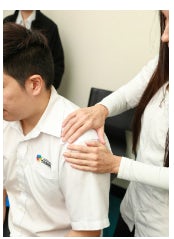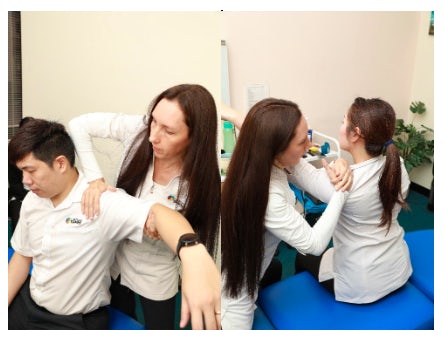
Although golf might be considered to be a low-risk sport activity, poor mechanics and technique can result in injury. For example, the swing requires a synchronized effort of muscle activation, timing and coordination to generate a high club-head speeds. Any incorrect repetitive action can result in musculoskeletal injuries over time especially if there is a lack of warming up, stretching or strengthening muscle to counteract overuse injuries. The forceful rotation and impact of swinging a golf club can also lead to sprained wrists, elbow injuries and more commonly, shoulder injuries. The most common shoulder injuries that can affect a golfer includes biceps tendon injuries, rotator cuff tears, shoulder impingement and shoulder joint instability.
 There are two classifications of shoulder injuries:
firstly, there are acute injuries which come from a single traumatic episode/incident, or chronic injuries which occur overtime and often come from the micro-traumatic stress you place on your back and shoulders when swinging. There are 5 main causes of shoulder injuries while golfing:
There are two classifications of shoulder injuries:
firstly, there are acute injuries which come from a single traumatic episode/incident, or chronic injuries which occur overtime and often come from the micro-traumatic stress you place on your back and shoulders when swinging. There are 5 main causes of shoulder injuries while golfing:
The modern golf swing emphasizes on distance which is puts more of a strain on the body than the classic golf swing. With a classic golf swing, the hips are aligned with the shoulder and pelvic- shoulder rotation is equal. Where as in the modern swing, the hips are ahead of the shoulders and there is limited pelvic rotation and therefore it puts more stress on the shoulders and creates a greater potential for injury. Each shoulder does a very specific and opposite motion when swinging a club, the leading shoulder is stretched into an extreme adducted position while the non-leading shoulder is in an abducted externally rotated position.
Common shoulder conditions in golfer’s include:
Depending on the severity of the case, we tailor our treatment plans to fit the individual’s case. We employ a variety of treatment modalities such as low-level cold laser therapy, interferential electrotherapy, soft tissue work, dry-needling, kinesio-taping, and manual and instrument adjustments. The treatment goal is to promote healing. Our Chiropractor will prescribe take-home exercises for stretching and strengthening affected muscle groups to get a the biomechanics right for the golf swing.

Getting your biomechanics right- Make sure to practice the proper form: Repetitive improper technique can increase the likelihood of a shoulder injury. Stretches and warm-ups are necessary to get your body moving right.
Using the right equipment: Club length and weight are important when it comes to golfing. Always choose the right equipment that is not too heavy and that you feel comfortable using regularly.
Be mindful not to overdo it: Pay extra attention to how your shoulder feels when swinging the golf club. If you begin to feel uncomfortable, tight or stiff consider taking rest and sitting out a few rounds until settles down.
If you have any questions or concerns, our chiropractors at Lakeside Chiropractic assist in helping you with your complaints. Lakeside Chiropractic is central to Perth’s northern suburbs in Joondalup including Kingsley, Woodvale, Heathridge, Yanchep, Clarkson, Jindalee, Leederville, Mullaloo, Sorrento, Padbury, Currambine and Hillary’s and is located in the centre of Joondalup on 3/45 Central Walk.
We have a HICAPS terminal on site which means you can claim direct from your health fund on the day of your treatment. We are a Medibank and BUPA preferred provider but we are also able to process claims from HBF, HIF, CU Health, health.com.au, ahm, Defence and Australian Unity Health. If your fund is not listed, please feel free to ask one of our friendly staff members. Here at Lakeside Chiropractic our staff are fully trained and regularly see visitors who they are able to successfully treat and improve posture and jaw pain. Please call us on 9300 0095 or on the website www.lakesidechiro.com.au via the Book Online Now tab.
Schedule an Appointment